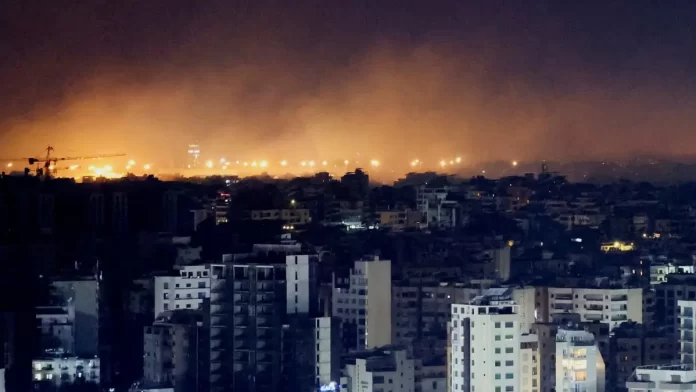In a significant escalation, Israel’s Defense Forces (IDF) launched “targeted ground raids” in southern Lebanon on Monday night, targeting Hezbollah infrastructure. The operation comes amid growing international appeals for a ceasefire as tensions between Israel and the Iran-backed militant group Hezbollah continue to intensify. The IDF, in a statement shared on the platform X (formerly Twitter), confirmed that these raids were based on “precise intelligence” and aimed at eliminating terrorist threats along the border.
Ground Offensive Targets Hezbollah Strongholds
The Israeli military said it struck several Hezbollah positions located near villages along the border, which it claims pose an immediate threat to civilian communities in northern Israel. The Israeli raids were conducted with air and artillery support to maximize precision, indicating the use of advanced surveillance and military technology to neutralize Hezbollah’s capabilities.
This operation marks the latest escalation in the broader conflict involving Hezbollah following Israel’s assassination of Hezbollah leader Hassan Nasrallah last Friday, which has significantly rattled the group. Despite calls from the international community—including the United States, European Union, and Arab nations—for restraint, Israel seems determined to proceed with its military objectives.
In accordance with the decision of the political echelon, a few hours ago, the IDF began limited, localized, and targeted ground raids based on precise intelligence against Hezbollah terrorist targets and infrastructure in southern Lebanon. These targets are located in villages…
— Israel Defense Forces (@IDF) September 30, 2024
10 Key Updates on Israel-Hezbollah Conflict
- Ground Raids Begin: Israel officially launched ground raids targeting Hezbollah positions in southern Lebanon on Monday night, focusing on terrorist infrastructure that threatens northern Israel.
- Ceasefire Calls Ignored: US President Joe Biden called for a ceasefire, but Israel has continued its military offensive, dismissing calls for restraint as it intensifies its fight against Hezbollah.
- Expanded Operations: Israeli Defense Minister Yoav Gallant indicated on Monday that the next phase of the war in southern Lebanon would begin soon, and that Israeli citizens displaced by Hezbollah rockets would be prioritized for protection.
- Hassan Nasrallah Assassination: Israel killed Hezbollah’s long-time leader Hassan Nasrallah on Friday, dealing a significant blow to the group and its backer, Iran. Nasrallah’s death has escalated tensions in the region.
- Humanitarian Crisis Deepens: The Lebanese government reports that 1,000 civilians have been killed and over a million displaced due to the ongoing conflict. The death toll in southern Lebanon continues to rise with at least 95 people killed in the last 24 hours alone.
- Closed Military Zones: The IDF declared several areas in northern Israel as “closed military zones,” signaling potential preparations for a more extensive ground invasion.
- Hezbollah’s Response: Hezbollah’s deputy leader, Naim Qassem, stated that the group remains prepared for further ground combat, signaling an ongoing escalation in the conflict.
- US Troop Deployment: The Pentagon announced that additional US troops will be deployed to the Middle East to support Israel’s defense against potential Iranian intervention.
- Israeli Airstrikes in Beirut: Israeli airstrikes hit several Hezbollah positions in Beirut’s southern suburbs, where the militant group has long operated underground.
- International Reactions: Despite increasing calls for a ceasefire from international leaders, including those in the Arab world and Europe, Israel has yet to indicate it will halt its military actions.
Hezbollah’s Resilience and IDF’s Strategy
Following the killing of Hassan Nasrallah, Hezbollah has lost one of its most prominent leaders, which could weaken its operational capabilities. However, the group, which has been supported and funded by Iran for decades, remains a formidable force in Lebanon. The IDF’s decision to launch ground raids at this juncture suggests that Israel is confident in its intelligence and operational superiority, yet faces the risk of prolonged conflict on multiple fronts, including Gaza.
The Israeli Air Force continues to provide cover for ground operations, and it is expected that more strikes will target Hezbollah’s strongholds. The ongoing IDF campaign, dubbed Operation Northern Arrows, aims to dismantle Hezbollah’s infrastructure along the Lebanon border.
Calls for Restraint Amid Growing Fears of Wider War
The international community, particularly the US and its allies, has expressed growing concerns that Israel’s military actions could escalate into a broader conflict involving Iran. The US has cautioned Israel against a prolonged ground operation, particularly one that might push Tehran to engage directly.
Despite these warnings, Israeli leadership, including Prime Minister Benjamin Netanyahu, remains focused on neutralizing the Hezbollah threat, framing it as essential to the safety and security of Israeli civilians. Meanwhile, the Lebanese civilian population bears the brunt of the military operations, facing a humanitarian crisis that is rapidly deteriorating.
With Israel’s military focus now firmly on southern Lebanon, the conflict with Hezbollah appears far from over. As ground raids continue and international pressure for a ceasefire mounts, the region remains on edge, with the potential for wider geopolitical ramifications should Iran or other regional players intervene.






